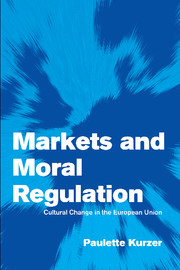Book contents
- Frontmatter
- Contents
- List of tables
- Preface
- 1 Markets versus morality
- 2 Binge drinking: the evolution of alcohol control policy in Finland
- 3 Our greatest social problem: anti-alcohol policy in Sweden
- 4 Nordic morality meets the European Union
- 5 Permissive pragmatism: drug control policy in the Netherlands
- 6 Harm reduction meets the EU: from public health to public order
- 7 Irish moral conservatism and European sexual permissiveness
- 8 The emergence of a European morality?
- Bibliography
- Index
Preface
Published online by Cambridge University Press: 16 October 2009
- Frontmatter
- Contents
- List of tables
- Preface
- 1 Markets versus morality
- 2 Binge drinking: the evolution of alcohol control policy in Finland
- 3 Our greatest social problem: anti-alcohol policy in Sweden
- 4 Nordic morality meets the European Union
- 5 Permissive pragmatism: drug control policy in the Netherlands
- 6 Harm reduction meets the EU: from public health to public order
- 7 Irish moral conservatism and European sexual permissiveness
- 8 The emergence of a European morality?
- Bibliography
- Index
Summary
This book is about the impact of market integration and supranational institution–building on Europe's cultural diversity. Europe is known for its rich mélange of cultures and this diversity, many observers agree, impedes the task of building a genuine political union. I ask in this study whether cultural diversity is diminishing and, if so, how this process unfolds, and what the actual consequences will be for Europe. My findings indicate that member governments are experiencing a loss of national sovereignty in the cultural sphere and that external pressures result in an ever so slight convergence of different styles of thought and actions. But I also show that the actual pace of adaptation is extremely gradual and that the immediate effect on the European Union is modest. My case studies are alcohol control policy in Finland and Sweden, drug policy in the Netherlands, and abortion in Ireland. I selected these issue areas because each sheds light on the conviction and collective rules of the national polity and thus opens a window on to Dutch, Irish, Finnish, and Swedish culture. At their most basic, drug and alcohol policies are public measures to regulate the circulation of mind-altering substances in society. But the way in which governments define the challenge and the kinds of measures they pursue communicates how a national community assesses the risks of intoxication for the individual and society. In turn, that assessment is colored by specific legal, historical, social, and institutional factors and is embedded in a public discourse and narrative. Likewise, the Irish constitutional ban on abortion encapsulates the centrality of Catholic teaching in Irish politics, culture, and institutional structures.
- Type
- Chapter
- Information
- Markets and Moral RegulationCultural Change in the European Union, pp. ix - xiiPublisher: Cambridge University PressPrint publication year: 2001

